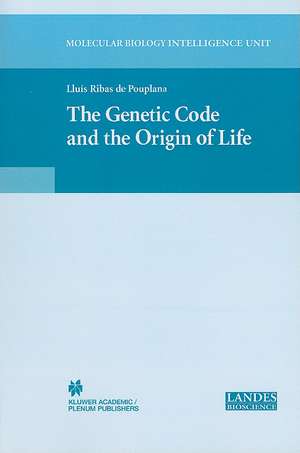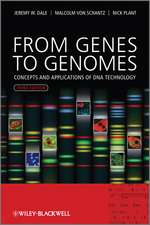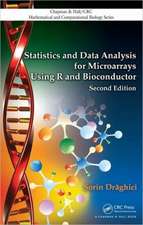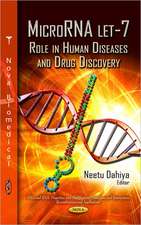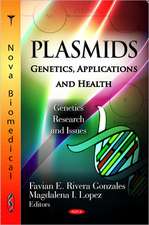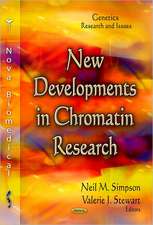The Genetic Code and the Origin of Life
Editat de Lluis Ribas de Pouplanaen Limba Engleză Paperback – 28 oct 2010
| Toate formatele și edițiile | Preț | Express |
|---|---|---|
| Paperback (1) | 937.68 lei 43-57 zile | |
| Springer Us – 28 oct 2010 | 937.68 lei 43-57 zile | |
| Hardback (1) | 954.31 lei 43-57 zile | |
| Springer Us – 17 oct 2004 | 954.31 lei 43-57 zile |
Preț: 937.68 lei
Preț vechi: 1143.51 lei
-18% Nou
Puncte Express: 1407
Preț estimativ în valută:
179.42€ • 187.84$ • 148.46£
179.42€ • 187.84$ • 148.46£
Carte tipărită la comandă
Livrare economică 07-21 aprilie
Preluare comenzi: 021 569.72.76
Specificații
ISBN-13: 9781441934130
ISBN-10: 1441934138
Pagini: 272
Ilustrații: XVI, 254 p.
Dimensiuni: 152 x 229 x 14 mm
Greutate: 0.38 kg
Ediția:Softcover reprint of hardcover 1st ed. 2004
Editura: Springer Us
Colecția Springer
Locul publicării:New York, NY, United States
ISBN-10: 1441934138
Pagini: 272
Ilustrații: XVI, 254 p.
Dimensiuni: 152 x 229 x 14 mm
Greutate: 0.38 kg
Ediția:Softcover reprint of hardcover 1st ed. 2004
Editura: Springer Us
Colecția Springer
Locul publicării:New York, NY, United States
Public țintă
ResearchDescriere
Early Thoughts on RNA and the Origin of Life The full impact of the essential role of the nucleic acids in biological systems was forcefully demonstrated by the research community in the 1950s. Although Avery and his collaborators had identified DNA as the genetic material responsible for the transformation of bacteria in 1944, it was not until the early 1950s that the Hershey-Chase experiments provided a more direct demonstration of this role. Finally, the structural DNA double helix proposed by Watson and Crick in 1953 clearly created a structural frame work for the role of DNA as both information carrier and as a molecule that could undergo the necessary replication needed for daughter cells. Research continued by Kornberg and his colleagues in the mid-1950s emphasized the biochemistry and enzymology of DNA replication. At the same time, there was a growing interest in the role of RNA. The 1956 dis covery by David Davies and myself showed that polyadenylic acid and polyuridylic acid could form a double-helical RNA molecule but that it differed somewhat from DN A A large number of experiments were subsequendy carried out with synthetic polyribonucleotides which illustrated that RNA could form even more complicated helical structures in which the specificity of hydrogen bonding was the key element in determining the molecular conformation. Finally, in I960,1 could show that it was possible to make a hybrid helix.
Cuprins
Foreword. Preface. 1. The Early Earth; Oliver Botta and Jeffrey L. Bada. 2. Reconstructing the Universal Tree of Life; James R. Brown. 3. The Nature of the Last Common Ancestor; Luis Delaye, Arturo Becerra and Antonio Lazcano. 4. Ribozyme-Catalyzed Genetics; Donald H. Burke. 5. The Scope of Selection; Michael Yarus and Rob D. Knight. 6. The Evolutionary History of the Translation Machinery; George E. Fox and Ashwinikumar K. Naik. 7. Functional Evolution of Ribosomes; Carlos Briones and Ricardo Amils. 8. Aminoacyl-tRNA Synthetases as Clues to Establishment of the Genetic Code; Lluís Ribas de Pouplana and Paul Schimmel. 9. The Relation Between Function, Structure and Evolution of Elongation Factors Tu; Mathias Sprinzl. 10. Origin and Evolution of DNA and DNA Replication Machineries; Patrick Forterre, Jonathan Filée and Hannu Myllykallio. 11. Early Evolution of DNA Repair Mechanisms; Jocelyne DiRuggiero and Frank T. Robb. 12. Extant Variations in the Genetic Code; Manuel A.S. Santos and Mick F. Tuite. 13. Adaptive Evolution of the Genetic Code; Rob D. Knight, Stephen J. Freeland and Laura F. Landweber. 14. Expanding the Genetic Code in Vitro and in Vivo; Thomas J. Magliery and David R. Liu. Index.
Caracteristici
This edited text is an important volume that celebrates the 50th anniversary of the discovery of the double helix.
Combining general overview with detailed describtions, this book is suitable for all students and researchers interested in the origins and discovery of DNA.
Includes supplementary material: sn.pub/extras
Combining general overview with detailed describtions, this book is suitable for all students and researchers interested in the origins and discovery of DNA.
Includes supplementary material: sn.pub/extras
